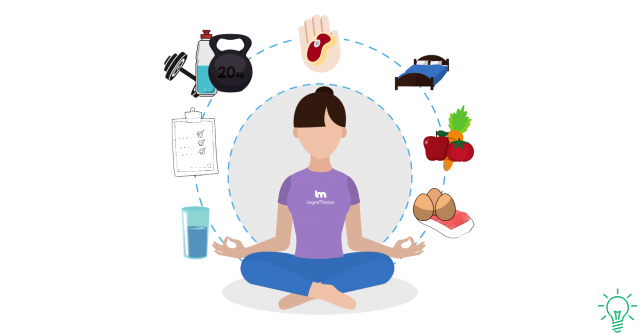Providing comfort and support for ourselves is as important as, or more so, than giving it to others. However, we are more used to criticizing ourselves for our mistakes than to being compassionate for every fall and disappointment.

Last update: July 15, 2022
Do we treat each other well? Do we offer ourselves comfort in the same way that we offer it to others? The truth is that this is often not the case. According to science, ignoring self-comforting techniques increases the risk of suffering from anxiety disorders or depression.
As a rule, we tend more towards self-criticism than self-comfort. We do this because our education and the rigid canons of society push us to be perfect and infallible. We strive not to make mistakes, to be highly effective, competitive and to be the best workers, the best partners, the best parents, the best friends, etc.
We aim for such high levels of performance that there is no room for vulnerabilities, errors or failures. It is not easy to console oneself when one looks at oneself with guilt and not with affection. It is not easy when we have been trained to be hard on ourselves to achieve precious - and impossible - perfection.
Providing comfort means feeling human and getting in touch with our emotions.
5 self-comforting techniques in difficult times
Self-comforting techniques are psychological strategies aimed at offering calm, emotional relief, and hope. Therefore, they help to work with themselves to find the same well-being that is obtained when you receive a hug or words of support. Giving us these emotional caresses is lawful, necessary and positive.
When going through a bad time, it is always wise to count on the comfort of those around us; however, we cannot rely solely on these external sources.
Not all the support we receive has to come from our social circle. We need to get comfort, support, consolation, and emotional validation from ourselves as well. Therefore, it is worth knowing some basic strategies to master this much-needed art.
1. Accept unpleasant emotions
The Comillas Pontifical University of Madrid, Spain, has conducted an interesting research study on the subject. Emotion-focused therapy, for example, appears to provide valuable resources for developing self-comforting skills.
Many people cannot easily accept the most troublesome and troublesome inner realities. Sadness, frustration, or anger due to disappointment, failure, or even distress have been ones we typically avoid.
It's easier to use autopilot and act as if these emotions don't exist. In light of this, one of the self-comforting strategies is to make room for what hurts and validate each emotion, even those with a negative value.
In no case should we say to ourselves "It's nothing, it's foolish to feel this way or get angry like this." The ideal, rather, is to accept every state of mind.
It should be borne in mind that painful feelings are usually temporary. They will gradually weaken if we don't avoid them, deny them or oppose them.
2. Self-comforting techniques: being kind to yourself
Psychologist Kristin Neff is known for her parents scientific contributions to a fundamental concept in psychology: self-compassion.
Being compassionate, therefore kind, with oneself means to stop judging oneself for one's shortcomings and mistakes and to accept oneself unconditionally.
But what mechanisms or strategies can help us develop self-compassion? Here are some simple examples:
- Treat yourself to quality time, rest, engage in activities that bring peace or satisfaction.
- Don't label your emotions as positive and negative, don't judge yourself. Embrace the person you are here and now, with his emotions.
- Using relaxation techniques to relieve tension, to better connect with yourself from a calm and peaceful state.
3. Less self-criticism and more self-empathy
Another self-comforting technique we can use is to turn off the critical inner dialogue. We all have a judge, who can be truly ruthless and not to forgive certain mistakes, to punish because we feel vulnerable, to label ourselves as weak and to belittle ourselves because they are not always effective and decisive.
To counter self-criticism we need to be more empathetic with ourselves. Godfrey T. Barrett-Lennard, professor of psychology at Murdoch University (Australia), talks about a research. Psychotherapy, he argues, must train the patient in this basic competence.
Self-empathy allows you to tune into the part of yourself that suffers, that is afraid, that navigates in sadness and that needs comfort. If you are empathic with friends or family, why not do the same with yourself?
Stopping being so strict and demanding on ourselves can be difficult. However, we need to train ourselves to use a kinder and more empathetic inner dialogue.
4. Refuges in which to let off steam, refuges in which to clear one's mind
Comforting means creating a safe space for the person to cry and express their needs. Likewise, provide means and strategies for putting aside suffering and embracing life. We must also do this with ourselves.
Among the various self-comforting techniques, it is recommended to find channels that allow you to vent your emotions. Writing, listening to music… Everyone always has their own cathartic refuges in which to let their inner self come out.
On the other hand, we do not hesitate to connect with scenarios that can relax us, think about other things, distract the mind (walking, traveling alone, etc).
5. Self-comforting techniques: the temporariness of pain
There is another strategy useful in difficult times: remember that nothing is eternal and that pain will hardly last forever. Only when we deny it does the suffering last longer than expected; only when we repress the wound or neglect ourselves, the anguish becomes chronic.
We accept that unexpected, that failure, that loss. Let us offer ourselves comfort as we would our best friend. Let's not turn our backs, but we try to be the best support for ourselves.


























